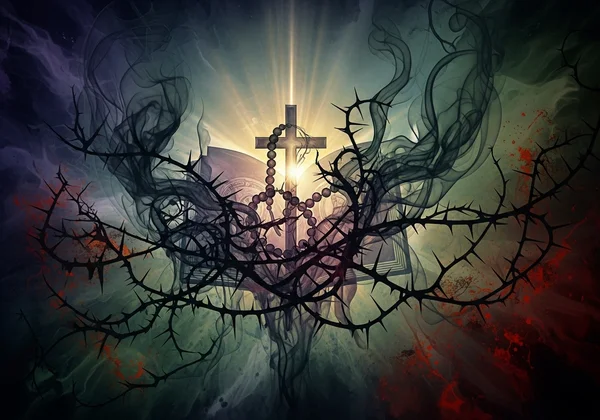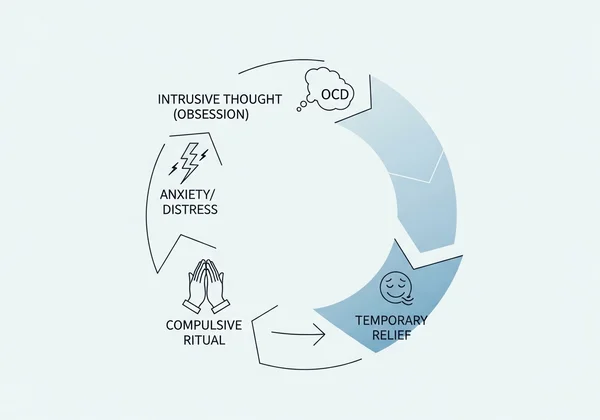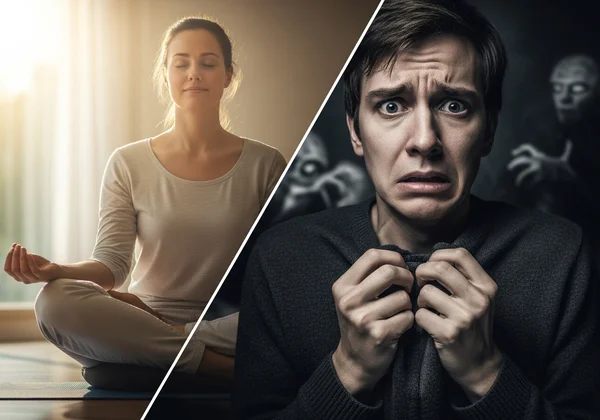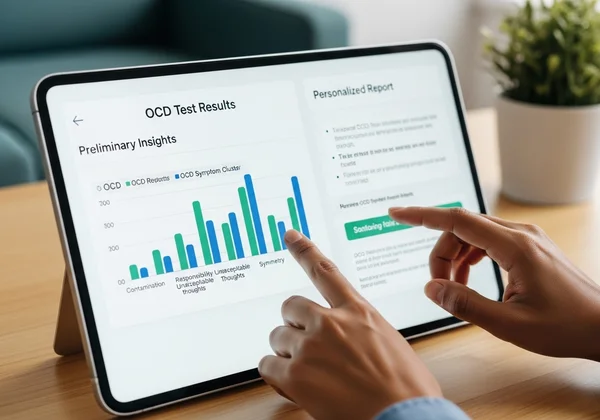Moral Scrupulosity OCD Test: Faith, Fear, & Assessment
September 2, 2025 | By Samuel Griffin
Imagine your most sacred beliefs turning against you, becoming a relentless source of torment. This intensely isolating experience is a reality for many grappling with Moral Scrupulosity OCD, a condition where intrusive thoughts hijack one's spiritual or ethical compass. If you've been asking yourself, "Do I have OCD?" this article will guide you through understanding this challenging, yet treatable, form of OCD. We will discuss how a specialized moral scrupulosity ocd test can be your first step towards understanding and relief. Taking a confidential free ocd test can provide the clarity you need to move forward.

Understanding Moral Scrupulosity: Symptoms & Signs
Moral or Religious Scrupulosity is a specific presentation of Obsessive-Compulsive Disorder where a person's primary fears revolve around violating their moral or religious principles. The doubt isn't about the existence of a higher power or the validity of a moral code; rather, it's a profound, persistent fear that one has personally failed, sinned, or acted unethically, often in microscopic or imagined ways. This form of OCD hijacks piety and turns it into a source of unending anxiety.
Understanding the specific scrupulosity symptoms is crucial for identification. These symptoms are not a sign of devout faith but rather the hallmarks of a clinical anxiety condition that latches onto what you value most. Recognizing these signs is the first step toward getting help and reclaiming your spiritual or moral peace.
What Exactly is Moral or Religious OCD?
At its core, this condition is about pathological doubt and an intolerance for uncertainty. A person with sincere faith may worry about sin but can generally find peace through prayer, reflection, or community guidance. For someone with Scrupulosity OCD, this reassurance is fleeting, if it comes at all. The definition of this condition centers on a vicious cycle: an unwanted, intrusive thought about sin or immorality triggers intense anxiety, leading to a compulsive ritual aimed at neutralizing the thought or preventing a feared consequence.
This is not a reflection of one's character. It is a neuropsychological condition where the brain's "error detection" system is in overdrive. It falsely flags harmless thoughts as grave threats, demanding an immediate, ritualized response. The relief from this ritual is short-lived, reinforcing the cycle and making the obsessions more powerful over time.

Common "Fear of Going to Hell OCD" Manifestations
One of the most distressing themes within Scrupulosity is the overwhelming fear of going to hell ocd. This fear manifests through specific obsessions and compulsions. It’s important to see these not as spiritual failings but as clinical symptoms.
Common obsessions include:
- Involuntary blasphemous or sacrilegious thoughts during prayer or worship.
- An intense fear of having committed an unforgivable sin.
- Worrying that you haven't prayed correctly or with enough sincerity.
- Constantly questioning if your actions are morally pure enough.
- Fearing you have accidentally lied, cheated, or offended God or others.
These obsessions lead to compulsions designed to reduce anxiety:
- Repetitive Praying: Reciting prayers over and over until they feel "just right."
- Constant Confession: Repeatedly confessing the same perceived sins to religious leaders, family, or friends.
- Reassurance Seeking: Constantly asking others if an action was sinful or immoral.
- Mental Rituals: Trying to "cancel out" a bad thought with a good one or a specific phrase.
- Avoidance: Avoiding places of worship, religious symbols, or situations that might trigger obsessive thoughts.
If these patterns feel familiar, an accurate ocd test can help you formally assess these experiences.
Is It Scrupulosity or Genuine Faith/Morality?
This is the central question for many who suffer in silence. It's a valid and important distinction to make. Sincere faith and a strong moral compass are sources of strength, community, and peace. Scrupulosity, on the other hand, is a thief of that peace. It creates a spiritual life defined by fear, not love or connection. The goal of understanding this difference is not to diminish one's beliefs but to separate them from the grip of a treatable mental health condition.
The line between deep devotion and obsessive fear can feel blurry from the inside. However, there are clear clinical markers that distinguish a healthy spiritual life from the patterns of OCD. Examining these differences can be an enlightening and validating process for those struggling with intense guilt and anxiety.
Key Differences: Intrusiveness, Distress, & Impairment
Three key factors help distinguish Scrupulosity from piety: intrusiveness, distress, and impairment. Devout thoughts are typically welcome and aligned with one's values, bringing a sense of purpose. Obsessive thoughts in Scrupulosity are intrusive and ego-dystonic, meaning they feel alien and are deeply distressing. They cause immense anxiety and guilt.
Furthermore, a key aspect of the OCD vs religious devotion debate is the level of life impairment. A strong faith enriches a person's life, relationships, and daily functioning. Scrupulosity does the opposite. It can consume hours of the day with rituals, lead to social withdrawal, and cause significant emotional suffering that interferes with work, school, and relationships.
When Moral Doubts Become Obsessive Compulsive
Normal moral doubts are a part of human growth. We reflect on our actions, feel remorse, and strive to do better. This process is constructive. Moral doubts become obsessive-compulsive when they lock into a rigid, cyclical pattern. The doubt is no longer a catalyst for growth but a trigger for a paralyzing ritual.
The cycle is relentless: an obsessive thought appears, creating a spike in anxiety. The individual performs a compulsion—like repetitive prayer or seeking reassurance—to find relief. The relief is temporary, and its fleeting nature convinces the brain that the compulsion is necessary for safety. This strengthens the connection between the obsession and the compulsion, ensuring the cycle continues with even greater intensity. Understanding this pattern is key to breaking free.

Taking a Moral Scrupulosity OCD Test Online
For many, the journey to understanding begins with a simple, private step. Taking a moral scrupulosity ocd test online can be an invaluable tool for gaining initial clarity. It provides a structured framework to examine your thoughts and behaviors, moving them from a confusing internal storm into a more understandable pattern. This is not a formal diagnosis but a powerful first step in self-assessment.
An online screening tool, especially one based on scientifically validated principles like the Obsessive-Compulsive Inventory (OCI), offers a reliable and accessible way to see if your experiences align with the known symptoms of OCD. You can start your assessment in a confidential setting, allowing for honest reflection without fear of judgment.
How an "OCD Self Test" Can Provide Initial Insights
An OCD self test serves as a mirror, reflecting your experiences against established clinical criteria. It asks questions that you may have been too afraid or confused to ask yourself. The structured format helps you quantify the frequency and severity of your intrusive thoughts and compulsive behaviors, providing tangible preliminary insights.
This process can be incredibly validating. Seeing your struggles described in the questions of a test can help you realize you are not alone and that what you are experiencing is a recognized condition, not a personal failing. It shifts the narrative from "I am a bad person" to "I may be experiencing symptoms of a treatable condition."
What to Expect from Your "Religious OCD Test" Results
After completing a religious ocd test, you will receive immediate results that offer a preliminary overview of your symptom severity. This score is a helpful indicator, providing a baseline for understanding your experiences. However, the true value often lies in what comes next.
After completing our assessment, you have the unique option to receive a comprehensive, AI-powered personalized report. This goes far beyond a simple score. It offers deeper insights into your specific symptoms, potential challenges, and how these patterns might be affecting your daily life. This personalized analysis can be an essential document to bring to a mental health professional, facilitating a more productive and informed conversation. Discover your results to gain this deeper understanding.

Moving Forward: From Doubt to Understanding
Recognizing that you might be struggling with Moral Scrupulosity OCD is a monumental step. It moves you from a place of shame and confusion to one of clarity and hope. This condition is not a crisis of faith or a character flaw; it is a recognized and highly treatable mental health condition. Effective, evidence-based treatments like Exposure and Response Prevention (ERP) have helped countless individuals reclaim their lives from the grip of OCD.
Your journey does not have to be one of suffering. With the right knowledge and support, you can learn to manage intrusive thoughts and resist compulsions, allowing you to engage with your faith or moral code in a way that is peaceful and fulfilling. The path forward begins with understanding.
Does anything in this article deeply resonate with you? Taking our free, confidential Moral Scrupulosity OCD Test offers a safe and reliable first step towards gaining critical insights into your experiences. Don't face this alone – your journey toward understanding and healing can truly begin today.
Frequently Asked Questions About Moral Scrupulosity & OCD Tests
Do I have Moral Scrupulosity OCD?
Only a qualified mental health professional, such as a psychologist or psychiatrist, can provide a formal diagnosis. However, if you are experiencing persistent, distressing doubts about your morality or religious purity that lead to repetitive behaviors, it is worth exploring further. An online screening tool can be an excellent first step. You can try our free tool to see if your symptoms align with those of Scrupulosity OCD.
How is Moral Scrupulosity different from sincere religious devotion?
The key difference lies in function and feeling. Sincere devotion typically brings peace, purpose, and a sense of connection, even when it involves self-reflection and striving for betterment. Moral Scrupulosity, in contrast, is characterized by intense anxiety, paralyzing doubt, and compulsive rituals that disrupt your life and bring you torment rather than comfort. It is a disorder of fear, not an expression of faith.
What should I do after taking an "OCD symptoms test" for scrupulosity?
Use your results as a tool for empowerment. If your score indicates potential symptoms, consider it a prompt to seek professional help. Share your results, especially if you opted for a detailed AI report, with a therapist who specializes in OCD and evidence-based treatments like ERP. This can provide them with valuable context and accelerate the process of getting effective support.
Can scrupulosity be effectively treated?
Absolutely. Scrupulosity is a well-understood subtype of OCD with highly effective treatments. The gold standard is a form of Cognitive Behavioral Therapy (CBT) called Exposure and Response Prevention (ERP). This therapy helps individuals gradually confront their fears without engaging in compulsive rituals, teaching the brain that the intrusive thoughts are not genuine threats. Many people who undergo proper treatment find significant and lasting relief.